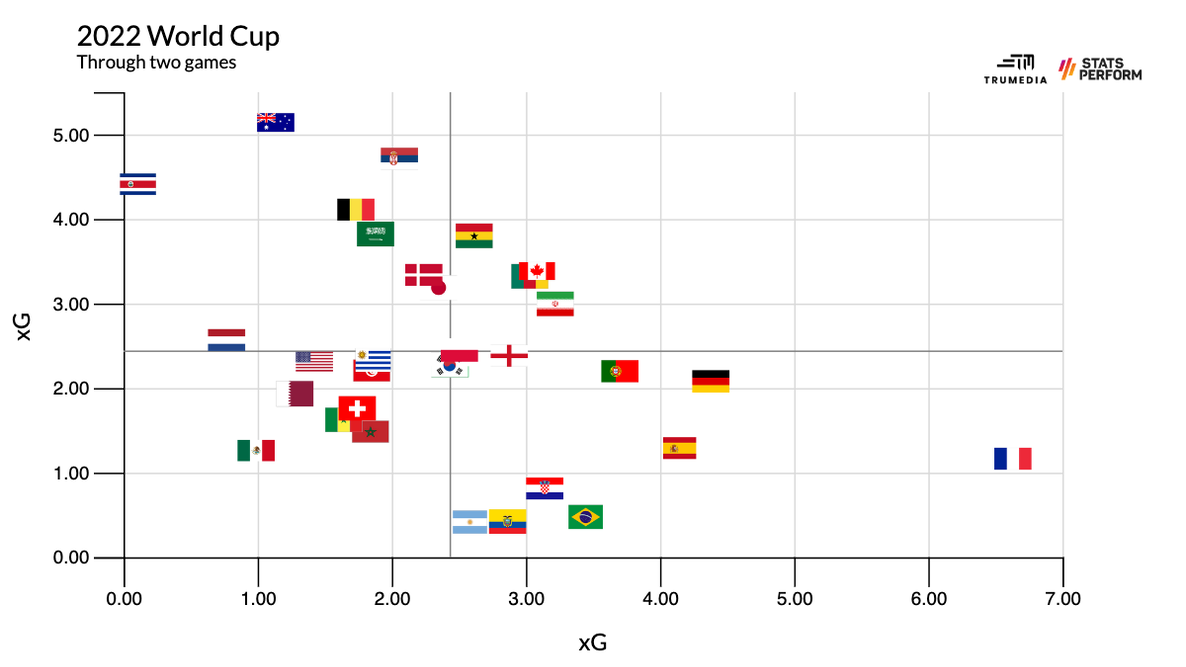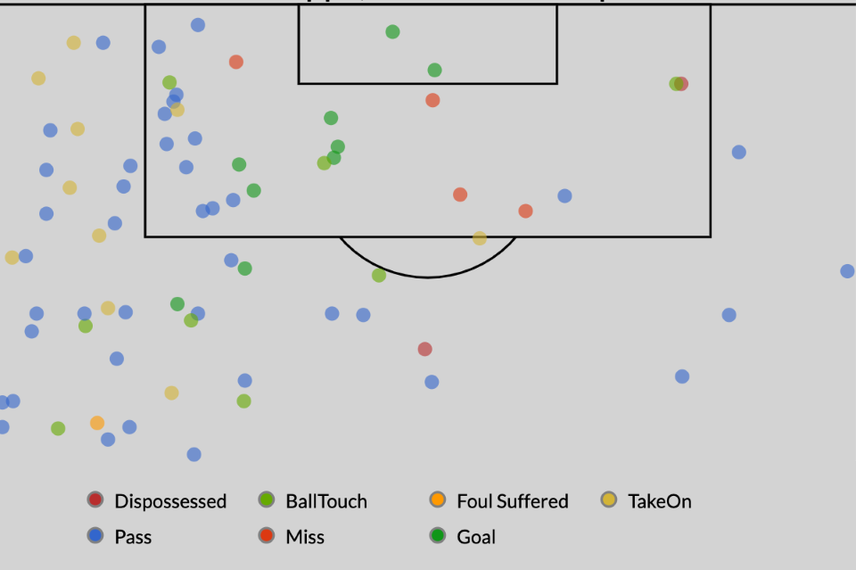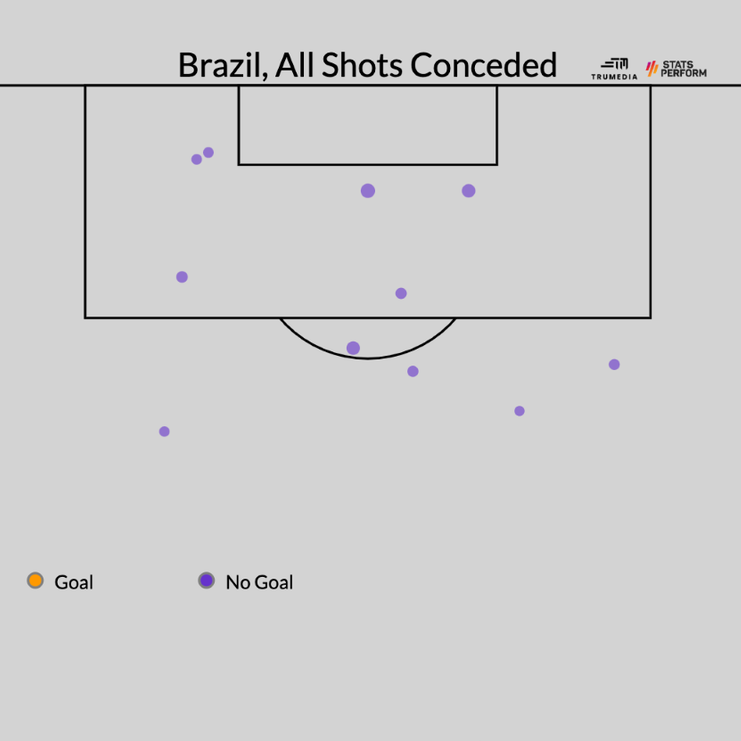We're only about a week into proceedings, and we've already reached the "social media graphic causes an international incident" stage of the World Cup.
It doesn't end there, either. United States coach Gregg Berhalter is being asked about naval ships and inflation. US captain Tyler Adams had to give his thoughts on systemic racism. Qatari fans are holding up pictures of former Germany star Mesut Ozil because the German national team covered their mouths during prematch photos. Other coaches are suggesting that Germany lost because they covered their mouths during prematch photos.
Cameroon benched their starting keeper because he maybe didn't want to kick it long on goal kicks. Canelo Alvarez is threatening Lionel Messi on social media because he touched a Mexico jersey with his foot. Iran manager Carlos Queiroz and former USMNT manager Jurgen Klinsmann appear to be on course for a celebrity Royal Rumble in a couple of months. A Croatian forward employed the phrase "We demonstrated who f---ed whom" in the aftermath of their 4-1 win over Canada.
Kevin De Bruyne joked that Belgium, the national team he stars for, can't win the World Cup because they're "too old." Netherlands coach Louis Van Gaal stopped a news conference so he could hug a journalist. Spain manager Luis Enrique logged on to Twitch to tell fans that the prospect of his players having a sex party was "not ideal."
- World Cup news, features, previews, and more
- Stream FC Daily and Futbol Americas on ESPN+
Phew. That's just a sample platter of everything that's happened off the field, not including all of the rakes that FIFA continues to insist it must step on.
Of course, we knew this World Cup would be weird, but it's been just as weird on the field, too. Qatar became the first host country to be eliminated after two matches. (OK, fine, not that weird!) Saudi Arabia beat Argentina. Japan beat Germany. Belgium got smoked by Canad, and then lost to Morocco. England got outplayed by the US. Costa Rica lost a game 7-0 without attempting a shot and then immediately won their next match against the team that had just beaten Germany. Iran lost a game 6-2 and are currently second in their group. Amid all the chaos, just two teams have been eliminated from knockout round contention after two matchdays.
But despite the sports-narrative machine seemingly blending everything together and spitting out results at random day after day, there does remain one thing that seemed true a year ago, two years ago, three, maybe four years ago -- hell, even 24 years ago: France and Brazil look like the best teams in the world.
The World Cup of Randomness
In the moment, every World Cup feels singular as if to say yes, this is the tournament filled with all of the things that had never happened before. We're not necessarily wrong to feel that way. The global soccer landscape changes so quickly that by the time four years are up, the context of the sport is something new. Outside of Messi and Cristiano Ronaldo, the stars who play it and the way they play it changes at every World Cup. This time, and every time, it's different.
But this time? It's not just different because it's always different. It's different because no one is winning, or everyone is winning -- other than Qatar and Canada.
Through 32 matches, just three teams have won both of their games. In each of the previous two tournaments, there were seven teams that took six points from their first two matches. In 2010, four teams had perfect records through two, while eight were two-from-two back in 2006. In fact, the last time the World Cup featured fewer than three perfect teams at this stage of the tournament was back in 1986, when Brazil and Denmark both won their opening pairs of matches. The Premier League didn't exist in 1986, and the majority of players competing in the 2022 tournament weren't alive.
Argentina's loss to Saudi Arabia stands out from everything else: the pre-tournament second favorites losing to a team that has never advanced out of the group stages. Per Caesars Sportsbook, the Saudis were +2500 to win. According to ESPN Stats & Information research, that makes it the fourth-biggest underdog victory across the World Cup, college and pro basketball, college and pro football, UFC, MLB and NHL since 2010.
However, I think this does a better job of summing up the first 10 days of the tournament than anything else: the second biggest upset was Costa Rica (+675) over Japan, who themselves sprung the third-biggest upset (+600) over Germany. The three other outright underdogs to win so far produced relatively large upsets, too: Morocco (+305) over Belgium, Iran (+260) over Wales, and Australia (+255) over Tunisia. For context, the implied probability of a plus-255-to-win underdog is about 28%. Japan's win over Germany was 14%. Saudi Arabia's win? 4%.
Through 32 matches in 2018, betting favorites were 20-7-5, for a 63% winning percentage. In 2022, they're 17-6-9, down to a 53% winning percentage.
But it's not just that the favorites are winning less often, or that long underdogs are winning more often. No, it's also that the games themselves have been more chaotic, too.
Lead changes in soccer aren't as common as in other sports because, well, you can score only one goal at a time, and goals are rare enough to begin with. But in Qatar, five games have featured lead changes, compared to just three at the same point in Russia. The same goes for the number of blown leads: five teams have opened the scoring, but then ultimately gone behind in the match, while we saw that happen only three times in 2018. And in that same vein, 56% of the goals so far have been scored in the final 30 minutes of the match. Across the full group stage in 2018, 42% of goals occurred during the last half-hour.
Congrats to everyone in America who decided to sleep in and catch only the end of all the early matches. You've got it figured out.
Why France and Brazil are better than everyone else -- now and always
Around this time last year, Brazil and France were the two clear betting favorites to win the World Cup, mainly because of the sheer depth of talent for both sides. While other sides had similarly strong starting lineups, no one else could fade the number of potential injuries or changes in performance that might occur. No one had a larger pool of players who could theoretically suddenly turn into stars, either. And although those betting numbers shifted a bunch over the past 365 days, we're right back where we started -- for the same reasons.
Through two games, France have simply been the best team in the tournament. They broke the reigning winner curse, becoming the first champ since Brazil in 2006 to not get knocked out before the knockout rounds in the following World Cup. They also broke the curse of, um, "being France," as they avoided enough of the intra-squad drama that immolated some of the most talented French sides of the past 20 years. And they did it despite everything seemingly breaking against them.
First, N'Golo Kante, Chelsea's world-class defensive midfielder, was ruled out of the tournament due to injury. Then his midfielder partner from the 2018 title-winning team, Juventus' Paul Pogba, suffered the same fate. It seemed like a massive blow; the talents of Pogba and Kante allowed France to play a midfield two while most others rely on three players to control the same area. That was their cheat code. But if anyone could weather that double hit, it was France, who now not only had the celestial electricity of Kylian Mbappe but also reigning Ballon d'Or winner Karim Benzema, who didn't play in 2018, but had since been welcomed back into the squad after being found guilty of "complicity" in the attempted blackmail of a former France teammate over a sex tape. (See what I mean!)
Then Benzema too was ruled out with an injury just days before the tournament started, and just days after one of his backups, Christopher Nkunku of RB Leipzig in Germany, was also ruled out.
Well, guess what? None of it matters.
Since France is France -- home to Paris, the most talent-dense soccer city on planet Earth -- they were able to replace Pogba and Kante with Adrien Rabiot and Aurelien Tchouameni, who play for Juventus and Real Madrid respectively. In perhaps a sad and twisted stroke of fortune, the more defensive Lucas Hernandez, a center-back masquerading as a full-back, tore an ACL in the opening match against Australia and was replaced by his brother Theo, one of the best attacking full-backs in the world.
Benzema was replaced by Olivier Giroud, the starting centre-forward from 2018, and on the opposite wing from Mbappe entered Ousmane Dembele, the most devastating two-footed winger in the world who's also enjoying the first extended run of health of his young career. Dembele is unstoppable with the ball at his feet, Mbappe is unstoppable with the ball off his feet, and Theo has the athleticism to fill all the wide spaces that Mbappe creates with his movement.
With Giroud playing as a target man and Antoine Griezmann filling in the central spaces created by all the attention given to Dembele and Mbappe, it just fits together so well. Everything seems so easy.
Through two games, France have produced an expected-goal differential -- think of it as the quality of chances they created, minus the quality of chances they conceded -- of +5.47. No other team has even reached +3.

Mbappe, in particular, has been lights out. Through two games, he leads all players in non-penalty xG with 2.3, while no one else is even at 2.0. He has attempted 13 shots, four more than anyone else. He has made 19 shot-creating actions (any of the two actions -- passes, interceptions, dribbles, etc. -- prior to a shot attempt), and no one else has more than 14. He has received 30 progressive passes (roughly, passes that move the ball 10% closer to goal), which is 12 more than anyone else, and he's taken 27 touches inside the penalty area, nearly double the next most (14).

Some of France's stats are inflated from their 4-1 drubbing of Australia, who are not a very good team, but they also dominated the balance of chances against Denmark, who had the ninth-best odds to win the whole thing before the tournament began.
Brazil, meanwhile, have struggled to get going on the attacking end. They've attempted 36 shots, third most behind Germany and France, but they're averaging just 0.096 xG per shot -- below the tournament average of 0.113. However, they've probably played the toughest two matches of any team; FiveThirtyEight rated Switzerland as the 13th-best team in the tournament and Serbia as the 16th-best. In other words, they've played two knockout round-quality opponents and conceded 0.48 xG... total. They've conceded just 11 shots, at a tournament-low 0.043 xG/shot. And along with Morocco and Poland, they're the only team yet to allow a goal.
Normally, you have to sacrifice shot quality or quantity somewhat. If you want to limit shot quality, you usually need to cede some control in order to get numbers behind the ball, which inevitably leads to more -- but lower-quality -- shots. And if you want to limit shot quantity, you usually have to defend aggressively, leave space in behind, and concede the odd high-quality shot from a fast break. Not Brazil, though:

It's not like the attack has been all that bad, either. Since they're able to control the field so well -- 67.7% of final-third possession, second only to Spain -- and create so many shots, they've still generated the fifth-most xG: 3.44. Compare that to their defensive performance, and they have the second-best xG differential (plus-2.97) after France. (If you're wondering why we're not talking about Portugal, who are the third perfect team so far, it's because they have a negative xG differential once you strip out penalties.)
Oh, and Brazil did it without their superstar, Neymar, for their most recent game against Switzerland. While Paris produces more soccer players than any other city, Brazil, with its 215 million-strong soccer-loving population, produces more professional players than any other country. To wit: the possible replacements for Neymar play for Arsenal, Arsenal, Real Madrid, Manchester United and Manchester United. Liverpool's Roberto Firmino is currently fourth among all players in the Premier League in non-penalty goals plus assists per 90 minutes -- and he didn't even make the squad!
So as we progress through the final round of group stage matches, it does seem like some of the micro- and macro-trends have begun to shine through. Having the World Cup in the middle of the professional season appears to have made the game more unpredictable because of the wildly different fitness levels of all the players and the lack of prep time for each team. More broadly, it really does look like the rest of the world is getting better at playing the tournament that only seven countries have won. Even if the underdogs have to play like they always have -- sit deep, defend and counter -- their tactics are more organized, the players are better at defending, and they're better at capitalizing on the few chances they might get in a given game.
That's all true -- except when you get to the top. For France and Brazil, geography still seems like it might be destiny.
